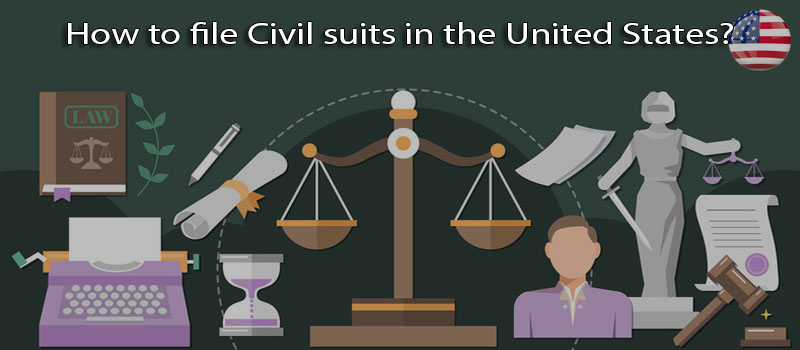
What is a civil suit in the USA?
A civil suit is a non-criminal lawsuit that begins with a small complaint and generally involves private parties. In a civil matter, the party who initiates a lawsuit is the party filing the complaint, and the defendant is the party defending against the complaint’s allegations.
The fundamental difference between civil suits and criminal cases is that they seek compensation or different damages instead of criminal charges in a civil suit. Civil cases may involve such things as:
- Tortious claims: Cases involving personal injury, battery, default issues, Scandals, medical malpractice, fraud, and many others.
- Violation of contract claims: Legal action for not completing a job, not paying in full or on time, failing to deliver goods sold or promised, and many others.
- Equitable claims: Cases for a court order to stop property destruction, land sale, and many more.
- Landlord-tenant claims: Cases where a landlord is trying to evict a tenant, or a tenant has moved out and sued a landlord for the return of a security deposit.
How do civil suits proceed through the legal system in the USA?
To begin a civil suit in federal court, the complainant files a complaint with the court and “serves” a copy of the defendant’s complaint.
It is a broad category that includes everything from suits such as a violation of contract or personal injury, divorce proceedings, cases involving child custody, and lawsuits against government officials and agencies.
The complaints explain how they got harmed by the defendant and describe the injuries and damages. A complainant may seek money to repay the damages or ask the court to order the defendant to stop the conduct that is causing the harm.
There are four main steps after processing the complaints in the USA.
- Case preparation: There may be discovery, where parties to the dispute must provide the case information to each other, such as copies of documents and the identity of witnesses related to the case. The purpose of the discovery is to prepare for trial by requiring the parties in dispute to assemble their evidence and call witnesses.
- Settling Differences: To avoid the expense and delay of having a trial, judges urge the parties in disputes to try to reach an agreement to resolve their dispute.
- Trial Process: By applying testimony rules, the judge decides which information may be presented in the trial. So that witnesses speak on their own and do not change their story based on what they hear from another witness. They are kept out of the courtroom until they testify.
Closing: After testimony is heard, each side gives a closing argument. The judge will explain the law appropriate to the case and the decisions the panel needs to make.
Get resolute civil litigation solutions from our immensely experienced legal experts to relieve yourself from all worries regarding civil suits. Contact us today to learn more about our services and get our pertinent lawyer consultancy services at affordable rates.
